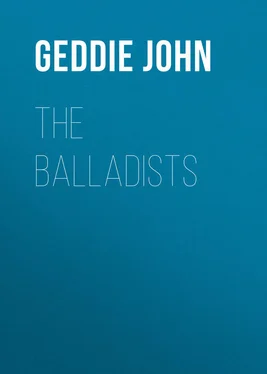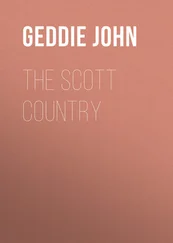John Geddie - The Balladists
Здесь есть возможность читать онлайн «John Geddie - The Balladists» — ознакомительный отрывок электронной книги совершенно бесплатно, а после прочтения отрывка купить полную версию. В некоторых случаях можно слушать аудио, скачать через торрент в формате fb2 и присутствует краткое содержание. Жанр: Критика, foreign_antique, foreign_prose, foreign_poetry, на английском языке. Описание произведения, (предисловие) а так же отзывы посетителей доступны на портале библиотеки ЛибКат.
- Название:The Balladists
- Автор:
- Жанр:
- Год:неизвестен
- ISBN:нет данных
- Рейтинг книги:3 / 5. Голосов: 1
-
Избранное:Добавить в избранное
- Отзывы:
-
Ваша оценка:
- 60
- 1
- 2
- 3
- 4
- 5
The Balladists: краткое содержание, описание и аннотация
Предлагаем к чтению аннотацию, описание, краткое содержание или предисловие (зависит от того, что написал сам автор книги «The Balladists»). Если вы не нашли необходимую информацию о книге — напишите в комментариях, мы постараемся отыскать её.
The Balladists — читать онлайн ознакомительный отрывок
Ниже представлен текст книги, разбитый по страницам. Система сохранения места последней прочитанной страницы, позволяет с удобством читать онлайн бесплатно книгу «The Balladists», без необходимости каждый раз заново искать на чём Вы остановились. Поставьте закладку, и сможете в любой момент перейти на страницу, на которой закончили чтение.
Интервал:
Закладка:
John Geddie
The Balladists
PREFACE
Not much more has been attempted in these pages than to extract the marrow of the Scottish Ballad Minstrelsy. They will have served their purpose if they help to awaken, or to renew, a relish for the contents of the Ballad Book. To know and love these grand old songs is its own exceeding great reward; and it is also, alas! almost the only means now left to us of knowing something concerning their nameless writers.
Questions involving literary or critical controversy as to the age and genuineness of the ballads have been, as far as possible, avoided in this popular presentation of their beauties and their qualities; and in case any challenge may be made of the origin or authenticity of the passages quoted, I may say that, in nearly every case, I have prudently, and of purpose, refrained from giving the authority for my text, and have taken that which best pleases my own ear or has clung most closely to my memory.
J. G. July 1896.CHAPTER I
BALLAD CHARACTERISTICS
'Layés that in harping
Ben y-found of ferli thing;
Sum beth of wer, and sum of wo,
Sum of joye and mirthe also;
And sum of treacherie and gile;
Of old aventours that fell while;
And sum of bourdes and ribaudy;
And many ther beth of faëry, —
Of all things that men seth;
Maist o' love forsoth they beth.'
Who would set forth to explore the realm of our Ballad Literature needs not to hamper himself with biographical baggage. Whatever misgivings and misadventures may beset him in his wayfaring, there is no risk of breaking neck or limb over dates or names. For of dates and names and other solid landmarks there are none to guide us in this misty morning-land of poetry. The balladist is 'a voice and nothing more' – a voice singing in a chorus of others, in which only faintly and uncertainly we sometimes fancy we can make out the note, but rarely anything of the person or history, of the individual singer. In the hierarchy of song, he is a priest after the order of Melchisedec – without father or mother, beginning of days or end of life.
The Scottish ballads we may thus love and know by heart, and concerning their preservation, collection, collation, we may gather a large store of facts. But the original ballad-writers themselves must remain for us the Great Unknown. Here and there one can lay down vague lines that seem to confine a particular ballad, or group of ballads, within particular bounds of place and of time. Here and there one seems to get a glimpse of the balladist himself, as onlooker or as actor in the scenes of fateful love and deathless grief which he has fixed for ever in the memory of men of his race and blood. There are passages in which, in the light and heat of battle, or in agony of terror or sorrow, we are made to see something of the minstrel as well as his theme. But by no research are we likely at this late date to recover any clew to the birthplace or to the lineaments of the life and face of the grand old poet who wrote the grand old ballad of Sir Patrick Spens ; nor do towns contend for the honour of having produced the sweet singer of Kirkconnel Lea , the blithe minstrel of Glenlogie , or the first of all the bards who made the Dowie Dens of Yarrow vocal with the song of unavailing sorrow.
And in truth towns – even such towns as were in those days – could have had but little to do with the birth and shaping of the Scottish Balladists. Chief among the marks by which we may the true ballad-maker know among the verse-makers of his age, is the open-air feeling that pervades his thought and style. Like the Black Douglas, he likes better to hear the laverock sing than the mouse cheep. It is not only that he cares to tread 'the bent sae brown' rather than the paved street; that the tragedies of fiery love and hate quenched by death, in which he delights, are more often enacted under the blue cope of heaven than under vault of stone. What we seem to feel is that these simple old lays, in which lives a passion that still catches the breath and makes the cheek turn pale – whose 'words of might' have yet the power to waft us, mind and sense, into the 'Land of Faëry,' must have been conceived and brought to full strength under the light of the sun and the breath of the wind. 'The Muse,' says Robert Burns, himself of the true kin of the balladists:
'The Muse, nae Poet ever fand her,
Till by himsel' he learned to wander,
Adown some trottin' burn's meander,
An' no think lang.'
Certainly no true ballad was ever hammered out at the desk. It may have been wrought and fashioned for singing in bower or hall; but the fire that shaped it was caught, in gloaming grey or under the 'lee licht o' the mune,' in birken shaw or by wan water.
It is true that one of the earliest of the Scots ballad-makers whose names have been handed down to us – Robert Henryson, who taught the Dunfermline bairns in the hornbook in the fifteenth century – has told us that he sought inspiration at the ingleside over a glass:
'I mend the fyre, and beikit me about,
Then tuik ane drink my spreitis to confort,
And armit me weill fra the cold thairout;
To cut the winter nicht, and mak it schort,
I tuik ane quhair, and left all uther sport.'
But this was while conning, in cold weather, the classic tale of Troilus and Cressid . Robin and Makyne , which among Henryson's acknowledged pieces (except The Bluidy Sark ) comes nearest to our conception of the ballad – after all it is but a pastoral – has the scent of the 'grene wode' in summer.
In sooth, the Ballad Poet was neither made nor born; he grew. The 'wild flowers of literature' is the name that has been bestowed, with some little air of condescension, upon the rich inheritance he has left us. They are the purest and the strongest growth of the genius of the race and of the soil; and though they owe little save injury and mutilation to those who have deliberately sought to prune and trim them to please a later taste, they are as full of vigour and sap to-day as they were in the Ballad Age, when such poetry sprung up naturally and spontaneously. It is probable that not one of the old ballads that have come down to us by oral recitation is the product of a single hand; or of twenty hands. The greater its age, and the greater its popular favour, the greater is the number of individual memories and imaginations through which it has been filtered, taking from each some trace of colour, some flavour of style or character, some improving or modifying touch. The 'personal equation' is, in the ballad, a quantity at once immense and unknown. As in Homer's Iliad , the voice we hear is not that of any individual poet, but of an age and of a people – a voice simple, almost monotonous, in its rhythmic rise and fall, but charged with meanings multitudinous and unutterable.
The Scottish ballads are undoubtedly, in their present form, the outcome of a long and strenuous process of selection. In its earlier stages, the ballad was not written down but passed from mouth to mouth. Additions, interpolations, changes infinite must have been made in the course of transmission and repetition. Like a hardy plant, it had the power to spread and send down fresh roots wherever it found favourable soil; and in its new ground it always, as we shall see, took some colour and character from the locality, the time, and the race. Golden lines and verses may have been shed in the passage from place to place and down the centuries. But less of this happened, we may feel sure, than a purging away of the dross. As a rule, what was fittest – what was truest to nature and to human nature – survived and was perpetuated in this evolution of the ballad. When, in the course of its progress, it gathered to itself anything that was precious and worthy of remembrance, then, by the very law of things, this was seized and stored in the memories of the listeners and handed down to future generations.
Читать дальшеИнтервал:
Закладка:
Похожие книги на «The Balladists»
Представляем Вашему вниманию похожие книги на «The Balladists» списком для выбора. Мы отобрали схожую по названию и смыслу литературу в надежде предоставить читателям больше вариантов отыскать новые, интересные, ещё непрочитанные произведения.
Обсуждение, отзывы о книге «The Balladists» и просто собственные мнения читателей. Оставьте ваши комментарии, напишите, что Вы думаете о произведении, его смысле или главных героях. Укажите что конкретно понравилось, а что нет, и почему Вы так считаете.












